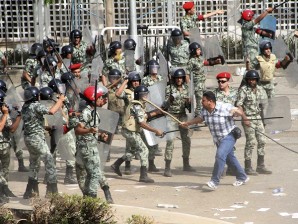Egyptian troops, protesters clash in Cairo

A protester, right, waves a stick at Egyptian soldiers during clashes outside the Ministry of Defense in Cairo, Egypt, Friday, May 4, 2012. Egyptian armed forces and protesters clashed in Cairo on Friday, with troops firing water cannons and tear gas at demonstrators who threw stones as they tried to march on the Defense Ministry, a flashpoint for a new cycle of violence only weeks ahead of presidential elections. AP/Ahmed Gomaa
CAIRO – Egyptian armed forces and protesters clashed in Cairo on Friday, with troops firing water cannons and tear gas at demonstrators who threw stones as they tried to march on the Defense Ministry, a flashpoint for a new cycle of violence only weeks ahead of presidential elections.
It was the second time this week that clashes have erupted near the ministry, after mainly Islamist protesters holding a sit-in there were attacked on Wednesday by still-unidentified assailants, sparking street battles that left nine dead.
The unrest threatens to escalate the confrontation that has centered between the ruling military and Islamist groups but is expanding to bring in other groups who sharply oppose the generals. Originally, the protesters at the Defense Ministry were a relatively small group of ultraconservative Islamists known as Salafis, angered over the disqualification of their favored candidate from the presidential race. But Wednesday’s violence fueled anger at the military and now more groups are taking to the streets.
Earlier Friday, thousands of demonstrators massed in Cairo’s downtown Tahrir Square, including the powerful Muslim Brotherhood, Salafis and leftist movements. They demanded the generals hand over power to civilians and warned of possible vote-rigging in the presidential vote, due to start May 23. In the afternoon, they marched to the Defense Ministry, several miles away across Cairo in the district of Abbasiyah.
The clashes erupted when protesters in Abbasiyah tried to cut through barbed wire between them and troops blocking access to the ministry. Live footage on state TC showed troops snatching one protester, beating him with metal sticks, tearing his clothes and leaving his back bloody.
Article continues after this advertisementThe troops fired water cannons at protesters and hurled stones at them to keep them from advancing. The protesters took shelter behind metal sheets snatched from a nearby construction site and hurled back stones. Others climbed the roof of a nearby university and showered soldiers with rocks from above. The troops then opened up with heavy volleys of tear gas that pushed the demonstrators back.
Article continues after this advertisementThe Health Ministry reported eight protesters were injured.
The violence has thrown the first presidential election since last year’s ouster of President Hosni Mubarak into turmoil, with several candidates suspending their campaigns in protest against the military’s handling of the situation.
On Thursday, members of the military council repeated their pledge to hand power once one of the 13 presidential candidates wins, an apparent attempt to assuage concerns that they would use the violence as an excuse to stay on.
But they also warned demonstrators against holding Friday protests near the Defense Ministry and said soldiers have the right to defend their positions, sparking fears of renewal of violence.
The circumstances of the deadly clashes that took place in Abbasiyah on Wednesday remain unclear.
Protesters believe the assailants were hired thugs or plainclothes police and troops, similar to past attacks on protests. They say the military allowed Wednesday’s attack to take place, noting troops nearby did nothing to stop fighting for hours.
But the Abbasiyah protests appear also to have drawn in local residents, angry at the week-long sit-in that have shut down their neighborhood. Locals complained that the Islamists sealed off streets.
The incident also highlighted what appears to be an emerging street force of more confrontative Islamists. Until now, most Islamist demonstrators have been affiliated with larger movements that steered them away from rallies likely to lead to clashes with the military or police.
Several Abbasiyah residents claimed to have seen bearded men among the protesters firing automatic weapons in the air during Wednesday’s violence. If anti-government demonstrators begin to openly brandish firearms at a rally, this would be a dangerous new development in Egypt’s post-Mubarak unrest.
The protesters in Abbasiyah were predominantly supporters of hardline Islamist Hazem Abu Ismail, a lawyer-turned-preacher, who was disqualified from the race because his mother allegedly held American citizenship, making him ineligible under election laws.
Abu Ismail has encouraged his followers to take the streets. “We are in the face of a plot to abort the revolution,” Abu Ismail’s spokesman Gamal Saber told the Al-Jazeera network on Friday.
But his supporters are not part of a disciplined movement like the Muslim Brotherhood, and he says that he has no control over the actions of protesters who are not from among his backers.
Members of non-Islamists, including members of the left- and liberal-leaning youth groups which led the 2011 uprising against Mubarak, have joined the Islamists in solidarity against the generals. However, others have accused Abu Ismail of dragging the whole nation to a disastrous confrontation with the military generals over his disqualification.